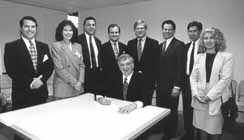Source: Original Commentary, August 22, 2011. In 1994, the State of Washington passed into law a new portion of the tax code designed to help create new high technology jobs, products, and companies. The bill was enacted for a period of ten years. It was reviewed and reenacted in 2005 for another five years. The bill is scheduled to be reviewed in 2012 by the Joint Legislative Audit and Review Committee. Some observers believe that there will be opposition to renewal of the law when it sunsets in 2015.
The Sales Tax Exemption for High Technology R&D/Manufacturing enacted into law by the Legislature in 1994 (ESSB 5201, enacted as RCW 82.63). The law exempts companies that manufacture or who are engaged in research and development from paying the sales or use tax on machinery and equipment used directly in manufacturing or research operations.
Sponsored by Rep. Bill Finkbeiner, the bill was the result of many years of work by numerous individuals from the private sector, the Department of Trade and Economic Development, the Legislature, the Governor’s office and the Department of Revenue. In the end, the legislation received bipartisan support in the House (78 yes; 15 no; 5 absent) and in the Senate (34 yes; 11 no; 4 absent).
In 2009, there were 484 companies that benefited from the R&D credits. The vast majority (357) employed fewer than fifty employees. They claimed credits of $23.8 million.

- 48 were environmental companies;
- 150 were makers of electronic devices;
- 33 developed advanced materials,
- 262 were advanced computing firms; and
- 78 were in biotechnology.
The bill created credits for the development of:
- Advanced computing;
- Advanced materials;
- Biotechnology;
- Electronic device technology; and
- Environmental technology.
In 2009, organizations that benefited from this law included:
- Pacific Northwest National Laboratory
- University of Washington
- Washington State University
- Itron
- Schweitzer Engineering Laboratories
- HaloSource
- Targeted Growth
- 3Tier
- Areva
- Optimum Energy
- Infinia